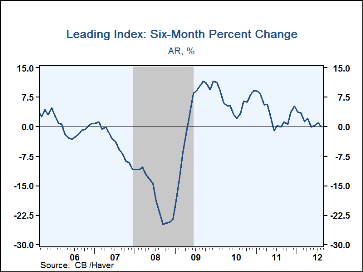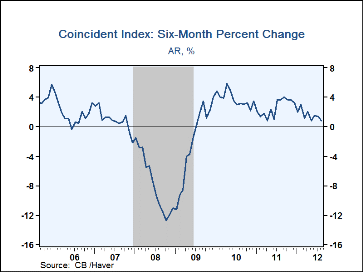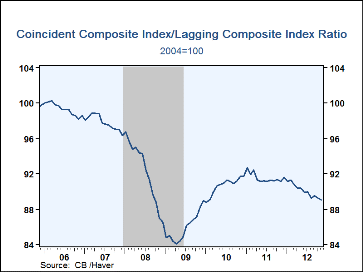 Global| Dec 20 2012
Global| Dec 20 2012U.S. Leading Economic Indicators Decline and Trend Growth Weakens
by:Tom Moeller
|in:Economy in Brief
Summary
The Leading Economic Indicator index from the Conference Board declined 0.2% during November following a 0.3% October gain, initially estimated at 0.2%. Fifty percent of the component series had a positive influence on the index last [...]
The Leading Economic Indicator index from the Conference Board declined 0.2% during November following a 0.3% October gain, initially estimated at 0.2%. Fifty percent of the component series had a positive influence on the index last month. A steeper interest rate yield curve, more building permits, a longer workweek and the leading credit index had the largest positive influences. These were offset by more initial claims for unemployment insurance, lower stock prices, a lower ISM new orders index and lower consumer expectations for business & economic conditions.
The index of coincident indicators increased 0.2% after a 0.1% October uptick. All of the component series contributed to the rise, notably manufacturing and trade sales. The index of lagging indicators rose 0.4% during November following a revised 0.1% gain. Three-quarters of the component series rose, including commercial & industrial loans outstanding, the change in the CPI for services and the consumer installment credit/personal income ratio.
Another leading economic series is the ratio of coincident-to-lagging indicators. It measures how the economy is performing versus its excesses. The figure fell last month to its lowest level since January 2010.
The Conference Board figures are available in Haver's BCI database; the components are available there, and most are also in USECON. The forecast figure for the Consensus are in the AS1REPNA database. Visit the Conference Board's site for coverage of leading indicator series from around the world.
| Business Cycle Indicators (%) | Nov | Oct | Sep | Y/Y | 2011 | 2010 | 2009 |
|---|---|---|---|---|---|---|---|
| Leading | -0.2 | 0.3 | 0.4 | 1.8 | 5.2 | 7.6 | -12.8 |
| Coincident | 0.2 | 0.1 | 0.2 | 1.8 | 2.8 | 2.5 | -7.7 |
| Lagging | 0.4 | 0.3 | 0.0 | 4.2 | 1.8 | -2.9 | -1.0 |
Tom Moeller
AuthorMore in Author Profile »Prior to joining Haver Analytics in 2000, Mr. Moeller worked as the Economist at Chancellor Capital Management from 1985 to 1999. There, he developed comprehensive economic forecasts and interpreted economic data for equity and fixed income portfolio managers. Also at Chancellor, Mr. Moeller worked as an equity analyst and was responsible for researching and rating companies in the economically sensitive automobile and housing industries for investment in Chancellor’s equity portfolio. Prior to joining Chancellor, Mr. Moeller was an Economist at Citibank from 1979 to 1984. He also analyzed pricing behavior in the metals industry for the Council on Wage and Price Stability in Washington, D.C. In 1999, Mr. Moeller received the award for most accurate forecast from the Forecasters' Club of New York. From 1990 to 1992 he was President of the New York Association for Business Economists. Mr. Moeller earned an M.B.A. in Finance from Fordham University, where he graduated in 1987. He holds a Bachelor of Arts in Economics from George Washington University.
More Economy in Brief
 Global| Feb 05 2026
Global| Feb 05 2026Charts of the Week: Balanced Policy, Resilient Data and AI Narratives
by:Andrew Cates










